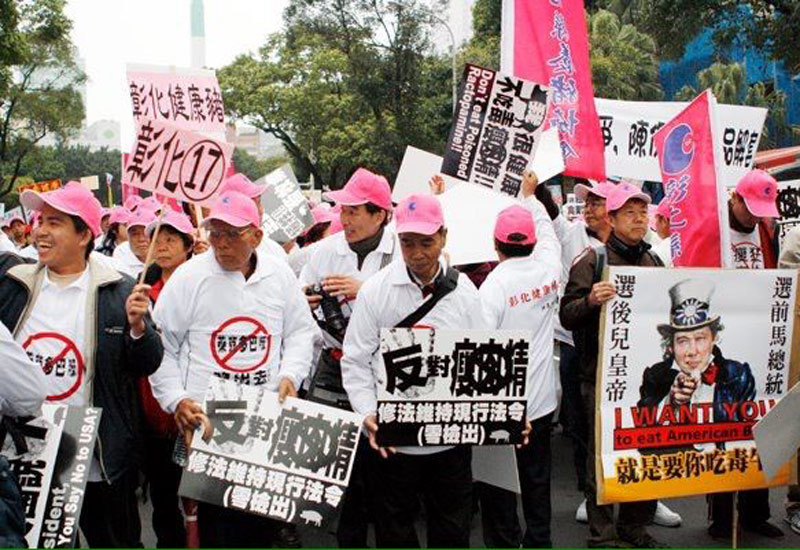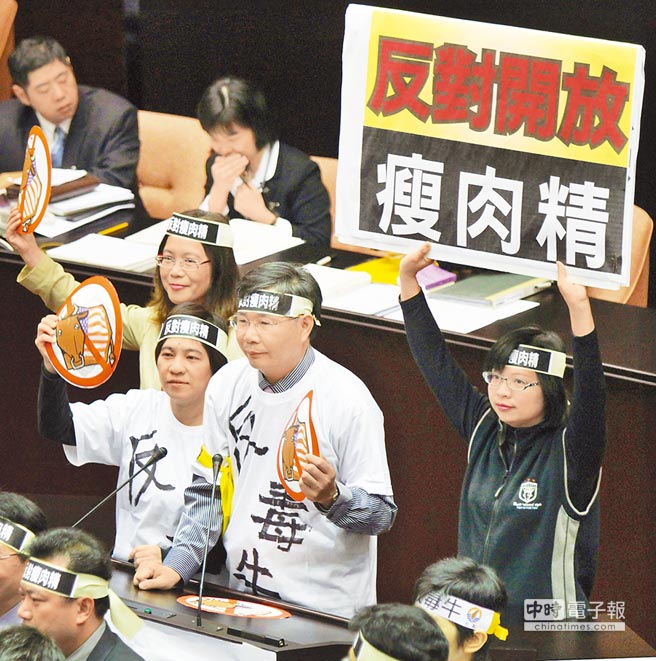by Brian Hioe
語言:
English
Photo Credit: China Times
POLITICAL OPPOSITION to American pork imports is shaping up to be a divisive issue concerning TPP ratification. While the DPP under Tsai Ing-Wen intends to push for TPP and therefore is moving in the direction of allowing for American pork imports, the New Power Party has taken a stand against pork imports, as has the Taiwan Solidarity Union and local farming groups. If this points to division within the pan-Green camp, the KMT has also jumped onto using the issue as a way to bash the DPP. The KMT has made this an issue going back to before 2016 presidential elections, attempting to highlight opposition to pork imports from the US not only during presidential debates but during campaign rallies.
The issue at hand is the chemical ractopamine, used to promote leanness in pigs. Imports of American pork into Taiwan have been banned since 2012, due to ractopamine’s prevalent use in the American pork industry. Before the ban, there were incidents of pork shipments from the United States being rejected due to detection of traces of ractopamine.
 Demonstrations against American pig imports in 2012. Photo credit: UDN
Demonstrations against American pig imports in 2012. Photo credit: UDN
The chemical is popularly thought to be dangerous to human health and has been linked to adverse effects in the health of pigs. 160 of the world’s 200 or so countries—including the European Union, China, and Russia—ban ractopamine because it has not been proven that ractopamine-treated pork are safe for human consumption. But ractopamine is used commonly in the US pork industry due to FDA approval.
Ractopamine allows farmers to cut costs by decreasing the amount of time it takes for pigs to grow lean muscle, but despite that most American pig farmers use it for that reason, ractopamine is a divisive issue in the pig farming industry. The FDA approval of ractopamine has seen criticism for insufficient research before approval.
There is a long history of issues regarding meat imports from the US into Taiwan in the past, particularly regarding beef imports with infection from BSE, better known as mad cow disease, and beef treated with ractopamine. Beef treated with ractopamine is currently allowed to be imported into Taiwan—something which has not been discussed much despite the current controversy we see now over imports of pork. This which was permitted after the easing of regulation on beef imports in 2012 after a period of controversy over the pork issue, with a cap being set on the amount of ractopamine in beef products which could be imported into Taiwan. However, imports of ractopamine-treated pork from the US has been an issue of controversy not only in Taiwan, but also in China, Russia, and Malaysia.
 TSU and DPP legislators demonstrating against US pork imports in 2007. Photo credit: China Times
TSU and DPP legislators demonstrating against US pork imports in 2007. Photo credit: China Times
The ractopamine issue in time, then, operates on multiple levels. First of all, under the food safety regulations that TPP member countries would have to enforce, countries judged to have equivalent food safety levels must allow for imports and exports from each other. This means Taiwan would have theoretically to allow for American pork imports containing ractopamine if it were to join the TPP.
It is such that incoming DPP Council of Agriculture minister Tsao Chi-hung has stated that Taiwan does not have the standing to try and reject American pork imports under the TPP. This is further complicated by Taiwan’s tenuous international standing and the fact that this would impede Taiwan’s ability to join the TPP to begin with. One of the key reasons for Taiwan joining the TPP would be to secure its international standing, with its lack of recognition as a nation-state by the majority of the world’s countries. The TPP in particular would be a way to build more stable ties with America, in order to defend against the threat of Chinese invasion.
But with the present scandal, we actually see a flip-flop in political position by which it is now the DPP pushing for allowing for American pork import, now that it is currently the ruling party of Taiwan. In 2012, when the KMT was the ruling party, the DPP, TSU, and PFP opposed pork imports. Yet in response to criticisms after Tsao’s comments, Tsai would later backtrack on the pork issue, stating that the DPP currently has no “preset stance” on US pork imports.
Apart from pointing to issues of food safety, the domestic pork industry in Taiwan has suggested that it would be severely harmed if American pork imports were allowed, seeing as 98% of pork products in Taiwan are currently locally produced. Demonstrations by pig farmers against allowing American pig imports go back to previous incidents in which the issue flared up in 2007. Demonstrations were backed by the TSU then, hence why it is not surprising that after a period of silence following its overwhelming losses during 2016 elections, the TSU would return to press the issue of opposition to American pork imports—and also why the NPP, which currently occupies the niche in legislature once filled by the TSU, would similarly oppose American pork imports.
Critics of opposition to American pork imports have argued on such grounds of the irrationality of opposing ractopamine-treated pork, akin to the reactions against GMO products in favor of organic food, which some dub to be unscientific paranoia not backed up by laboratory testing. Still others have accused those opposed to American pork imports of being small-minded protectionists, seeking to prop up Taiwan’s domestic pork industry at risk to international trade.
 William Stanton. Photo credit: Voice of America
William Stanton. Photo credit: Voice of America
In particular, William Stanton, former head of the American Institute in Taiwan (AIT)—America’s equivalent of an embassy to Taiwan in the absence of official diplomatic relations—has been a vocal critic of opposition to American pork imports on both grounds, claiming pork opposition to be irrational, unrooted in science, and a hindrance to American-Taiwan relations. Although it is not surprising as to why Stanton would have such a view, given his background, on that basis some have taken Stanton’s words as a sign of the continued centrality of the issue to maintaining American-Taiwan relations. During Stanton’s tenure as head of AIT, he spent much energy attempting to resolve the pork issue in order to allow for American imports. Current AIT head Kin Moy has continued this precedent, stating that while the choice on US pork is up to Taiwan, “these are the practices around the world” and if Taiwan wants to be “part of a larger integration in trade”, it should ratify US pork imports.
Yet the issue of American pork imports into Taiwan would not actually be the same issue as the debate over GMO products if—whatever Moy or Stanton claims to the contrary—it is that few countries outside of America actually approve the use of ractopamine. Food safety is already a recurrent issue in Taiwan, given rampant crony capitalism which allows the perpetrators of violations of food safety to get off with little punishment.
Moreover, in the case of America pushing for American pork imports into Taiwan and holding American-Taiwan relations as hostage, against the charge of small-minded protectionism on the side of Taiwan, this would be a case of a large country extorting security assurances from a small country for the sake of benefitting its own domestic industries—the geopolitical reality which is behind much of supposedly “international” free trade. Free trade is in many cases a euphemism for large countries imperialistically extorting smaller ones for security reassurances. Whatever the claims to the contrary by American diplomats that it is not America acting as a bully here, William Stanton going so far as to claim that it is in fact others and not America who have made the pork issue into a “political hostage” for American-Taiwan relations, this would certainly be the case here.
So, then, does much of the debate about pork go back to Taiwan’s status as a small country at the mercy of larger countries. And such questions are yet without resolution, ultimately returning to the issue of Taiwan’s relation with America, and Taiwan’s marginalization in the world.


 Demonstrations against American pig imports in 2012. Photo credit: UDN
Demonstrations against American pig imports in 2012. Photo credit: UDN TSU and DPP legislators demonstrating against US pork imports in 2007. Photo credit: China Times
TSU and DPP legislators demonstrating against US pork imports in 2007. Photo credit: China Times William Stanton. Photo credit: Voice of America
William Stanton. Photo credit: Voice of America